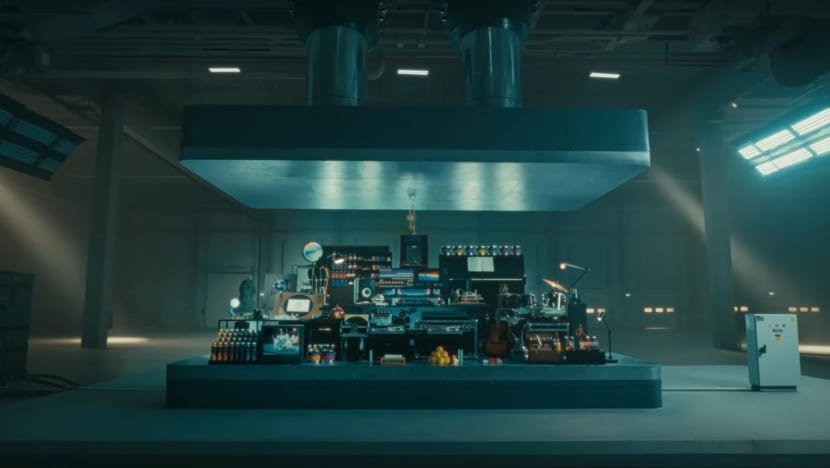Commentary: Apple’s tone-deaf iPad ad triggers our darkest AI fears
Apple’s iPad ad, Crush!, speaks to our broad fears that drastic advancements in technology are a grave risk to human creativity, says Dave Lee for Bloomberg Opinion.

Screengrab from Apple's iPad advertisement, "Crush!". (YouTube/Apple)
NEW YORK: I find it hard to believe that no one on Apple’s marketing team saw this coming. Maybe they were too timid to speak up. Perhaps they were overruled. Maybe they didn’t care.
But surely someone in that Cupertino spaceship in California could comprehend the grim imagery of its new iPad ad - titled simply Crush!- in which a giant crushing machine slowly squeezes a pile of beloved creative tools.
First, a trumpet, buckling. Then paint splattering everywhere. A bust, squashed. An upright piano, crushed, strings and hammers flying out with a horrific crunch. Camera lenses shattering.
The ad’s intended message was to suggest that all these wonderful tools could now be faithfully re-created using one of the new iPads announced Tuesday (May 7). But many saw something different, and backlash is picking up steam.
“Thank you to Apple for providing this excellent visualisation of how AI is made,” I half-joked on Threads. Others had the same thought. “Just a terribly cruel image,” one user wrote in response to Chief Executive Officer Tim Cook’s post of the ad on Twitter.
“How embarrassing,” wrote artist HappyToast. “Apple have mixed up their new iPad advert with one for their AI tools showing all human creativity being crushed out of existence.”
MARKETING FAUX PAS
It is Apple’s worst marketing faux pas since it forced everyone to listen to U2. It speaks to our broad fears that recent drastic advancements in technology are a grave risk to the joy, authenticity and spontaneity of human creativity.
For decades, Apple’s advertising has played on optimism around technology. Its iconic Orwell-inspired ad 1984, directed by Ridley Scott, placed Apple as the saviour of individualism against conformity - and we believed it (or at least, the people alive when it ran did. Sorry.).
Later, consumers were treated to the excellent iPod advertising, with those distinctive white headphones dangling and a pumping soundtrack. It heralded a world where our treasured music was becoming easier to buy, listen to and take with us.
As Apple has matured, its advertising has become mundane. Soft hues and cheerful scenes display the core features of the iPhone et al in an informative, if uninspiring, manner.
With this latest effort, Apple clearly decided to get a little bolder to push its new iPads. As I wrote earlier in the week, iPad is a product line in need of a shake-up given falling sales and something of an identity crisis over what exactly it is meant to be used for.
MORE CONCERNED RATHER THAN EXCITED ABOUT AI
Apple ended up running an ad that, for want of a better word, was triggering. Over the course of Apple’s lifetime, the sentiment toward technology has changed profoundly. We’re now more sceptical about the longer-term harms to our well-being or the effects of tech-enabled political division.
The breakthrough moment of ChatGPT in 2022 supercharged our fears. For the first time, we were having serious discussions about what it might mean when a computer has broad abilities to surpass even the brightest humans. Staring at countless unanswered questions, there seemed only one sure bet: The growing power of the unstoppable tech giants.
Apple is spending massively on artificial intelligence initiatives and has started trumpeting its products as being best-in-class for AI. We’ll hear more about the company’s AI work next month at its annual developers’ conference, where the company will be under pressure to show it hasn’t fallen behind Microsoft Corp. and others.
In these early stages, the creative arts have felt more vulnerable than most. More than half of American adults have concerns about the effects of AI on music, according to a recent YouGov poll, with the primary concerns being a lack of originality and impact on the livelihoods of human musicians. Just more than one in 10 adults (11 per cent) said they would support AI artists.
Meanwhile, OpenAI and other AI creators are being taken to court over their brazen collection of work that does not belong to them and using it to train AI. Overall, a separate Pew study suggests, more Americans are concerned rather than excited by AI.
It’s staggering that Apple has been unable to read this room. I doubt the company intended it this way - I’ve approached them for comment. A spokesperson will no doubt say the iPad is a friend to creatives, lowering the barrier to recording music or producing art.
This is true, of course, but it’s the bigger picture we’re talking about here. If Apple wants to sell to creatives, it needs to show it understands them. As a metaphor, the crushing machine is a publicity disaster.














